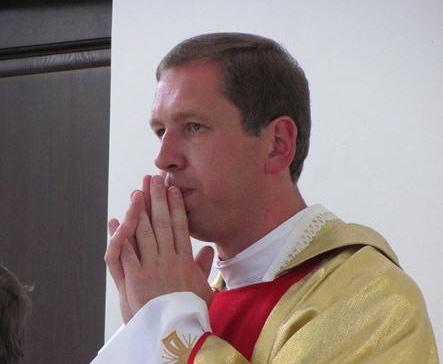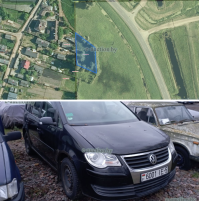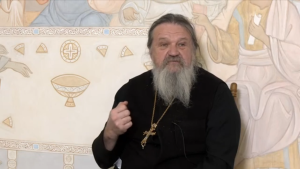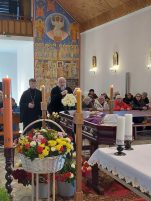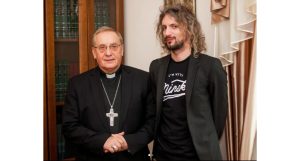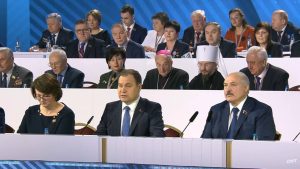“It reminds me of ISIS”. The Briton talks about his collaboration with the St. Elizabeth Convent


Tell us a few words about yourself and your way to Orthodox Christianity?
My name is Steve Lacey, I have worked in advertising and communications for a number of years. I’m disabled, having what’s called a “lobster hand”, which looks like a hook, a missing fibula and a shortening of my tibia. I also have only two toes on one foot and four on the other.
Today I’m going to talk to you about my personal journey and a little about my experience of the Russian Orthodox Church. Then, I’m going to give you some perspectives on St Elizabeth’s Monastery in Minsk – how I felt about them in the past and how and why this has changed.
I think I should start by asking forgiveness from the people of Belarus, especially those who fight for freedom and democracy there – my reasons for this will become clearer later.
It has been a long journey, but I have come through feeling much closer to God. In a way, this was a journey of radicalization and into the realms of darkness. The root of the darkness is Russian propaganda being spread through the Russian Orthodox Church, where it should have no place at all, and this includes the St. Elizabeth Convent, which is currently a conduit for views that I now find repulsive.
So let me tell you a little bit about my background, who I am, how I came to Orthodoxy and what my views were.
I first went to Russia in 1989 on a school trip and fell in love with Russian culture: with Dostoevsky, the bells, the ballet and all the other elements that make up the Russian culture that the Westerners find attractive. I used to go to Russia regularly for holidays after that. In 2004, I was working in advertising and drinking quite heavily. I went into a monastery in St Petersburg and I felt that mum, who had recently died, was with me, and that I needed to change my life. Before that I wasn’t Christian and hadn’t been baptised, so I walked out believing this was the right way, and got baptised in the Russian Orthodox Church.
Another observation that I had in Russia was that disability was not really recognised there, but was hidden and pitied, so I wanted to do as much in my own power to try and change attitudes towards disability. I was a member of the Diocese of Sourozh in London, and after the split,* I was very strongly on the side of Russia and Moscow Patriarchate. I served on the parish council and have also served on the parish council of the Cathedral of the Russian Orthodox Church Abroad, in London.
Did you know by that time about the political role played by Moscow Patriarchate and its connection with Putin’s regime?
The interesting thing about the Russian Orthodox Church is that at first I thought it was all about the realm of love, but you later realise, in reflection, that there is actually extremism there – it can be played to evoke extremist tendencies in a cult-like way that damns all outsiders and produces a spirit of pride that, by contrast with the outside, all within is perfect. Russian Orthodoxy (under these current conditions) sucks you in so that you end up going down into a dark rabbit hole and into darkness not into light.
So, by 2008, when Georgia was invaded, I upset a lot of my Georgian friends because I took the side of Russia.
In 2014, because I had been brought up in a very racist area of London I always hated the far right. So I started to believe all of the kind of narratives that RT conspiracy theorists and the church were pumping out: ridiculous narratives such as that Ukrainians are Nazis, that the far right is now in control of the Ukrainian government, that it’s a bipolar world, that it’s an American coup, that Ukraine wants to ban Russian language and Russian culture and that Ukrainians, Belarussians and Russians are one people. So all these narratives were sucking me in
Gradually, I started to come out of the extremist bubble, but it takes a long time to deradicalise. By 2019 I was coming to a more neutral position, but, by “neutral,” I mean I was questioning the essence of truth and believing Western media was biased, while I, by contrast, was avoiding politics. In a way the idea of religion as “the opium of the people” was true in my case – I was zombified and closed my eyes to human rights and dignity believing that it had no place in my life. Also, I still upheld some Russian propaganda narratives – the idea that Russian Orthodoxy needs to be protected and the ridiculous notion that the West wants to destroy Orthodoxy.
When and how did you first encounter St. Elisabeth Convent? What was your first impression?
I first met them at a concert. I’d heard about them a number of years ago, and the work they had been doing. As a disabled person, I was absolutely fascinated by the amazing things that I perceived they were doing with people with disabilities, alcoholics and drug users. These were all things that really appealed to my conscience. Also I was so attracted by their music and I had a strong feeling that they were a great creative force: very artistic and even a little hippyish, or hipster in their approach to Orthodoxy.
So, I met one of the key nuns who was on tour and asked if I could come and stay in Minsk. I then went and stayed in Minsk twice for around five weeks just before COVID. So this would be around 2019.
While I stayed at the monastery the people were absolutely lovely and they showed me around. They were very warm and I felt this was all an example of love and affection. But looking back, I can see that I was like a foreign tourist in the Soviet times being shown the best things.

What did you first think and why did you decide to help?
So from there, I decided to help them as much as I could. I used to give them lifts when they came to the UK, I promoted their concerts, I helped them find accommodation, I helped them on the stalls and I raised money for them. With someone else I raised £3000 and I put £1000 of my own money in to help the School.
I was in conversations with them to set up a charity foundation. The idea of the foundation is important, because they don’t have charity status in Europe apart from in Germany, which means their legal status and legitimacy to collect money is a little bit questionable. The whole aim of the foundation was to promote them in the media sphere in a positive way, to help them with communications, to help them with financial regulations, to help them to have a bank account here.
I also gave them media advice, which I am quite ashamed of. So, when they were being criticised by Christian Vision, I gave them advice about what Christian Vision would do and how they could counter that using a media strategy.
I also made videos when I was in St. Elizabeth’s, saying how full of love it was, and generally what a wonderful place it was. Then, when they were criticised on social media, I went on the defensive saying what a great place it was for its love. The convent also asked me to make investigations about Christian Vision, so I found a very loose link with Natalia** and Soros which they used to attack Natalia on social media – for this, I ask forgiveness.
How did they treat you on personal level? Did you have close friends there?
I did have close friends there. Without a doubt there are some very good people there, but we have to separate the institution from the people on the ground, that is, the top from the bottom.
How much did you help, to which projects? Did you collect money, how did you give it to them – by cash or via account? Did you have any reports on how the money was spent? What did they say about what they collect money for? Do you think they were sincere? Was there anything strange in their behaviour concerning money?
As already mentioned, I gave them quite a lot of money via Just Giving. I didn’t have any reports about how that money was spent. They told me that this money was being used for education and for the school, and at that time I felt that it was sincere. I also used to go and help in the markets and watch the long hours that the sisters would often work often on their own for very little pay. At that time I believed that the money was being spent for the purposes stated because, after all, they are a monastery.
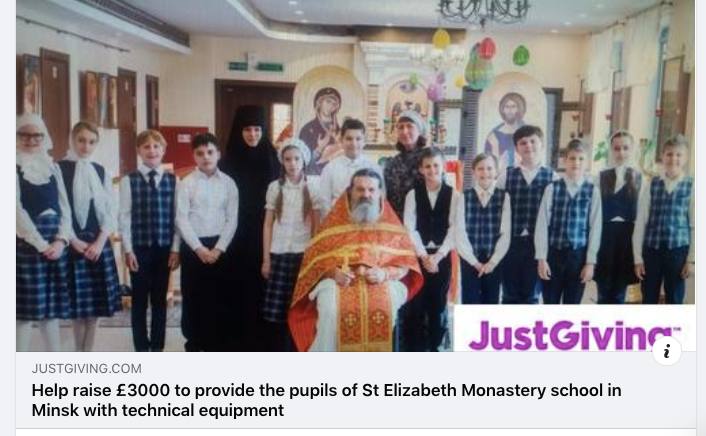
Did you know about their political position and activities?
Their political position and activities is an interesting question. At the time I was coming out of a more Orthodox fundamentalist position and maybe I was more neutral, so, in many ways, I thought they were in the centre, or on “the Royal path,” as Seraphim Rose would describe it. Therefore, I didn’t associate them with a fundamentalist position – how wrong I was! I had also read that their concerts had been attacked by those who were more traditionalist, and I felt they were also under attack by liberals and people who wanted a more liberal church. The convent told me the reason they were under attack was because they were a very rich and successful monastery and that people were jealous of them.
The only standout comment I remember from while I was there was when Father Andrew Lemeshonok said he thought Putin was a great leader. At the time I thought this was just a Russian mentality, so I didn’t think much of it then. They also told me that they support Patrick Lancaster financially – he is one of the big propagandists in Donbas – but they claimed that it was for humanitarian reasons.
Things started to change gradually for me, especially around Covid.
When and how did you first notice that they support dictatorship, violence, war? Did you talk with them at that time? How did they explain their statements or statements of their leadership?
So at first, when Covid happened, I was confused and I thought the whole debate about continuing to use one communion spoon and not closing churches was wrong, but, after a Facebook debate with Inga Leonova, I could see that my position was wrong. Inga made me start to think about things in a different way. Then, the stories started coming out about Covid, and how at the convent they were allowing Covid to spread. I started to get suspicious and a little bit worried about what was happening, but I still felt that they were under attack because people were jealous of their success (as I had previously been told). I started to feel a little concerned as the convent’s rhetoric was becoming very aligned with conspiracy theorists and the Far Right/Nazis in the US and Europe. Some people from the monastery would talk about how Covid was a microchip introduced by the New World Order, Masons etc – for me this was sounding very similar to what occultists believe.
Then the election in Belarus happened, and at the time, I was a little confused. Not being an expert in Belarussian politics, I was not sure what was going on and I had been brainwashed to believe that the issue of human rights was not compatible with Orthodoxy. Then it got more and more brutal, but at first, I thought, “Oh, this is just a little protest.” So, I asked the people of Belarus for forgiveness for my initial hesitation about what was right and what was wrong there. Then, more and more people came out on the streets, and you started to see the pure tyranny of ‘Europe’s Last Dictator.’ The biggest change for me was when the brave co-leader, Maria Kolesnikova, ripped up her passport, was arrested and sent to prison. I started to listen and understand how brutal and evil this dictatorship is and how cruel it is to its people.
I was also hearing stories about how people at St. Elizabeth’s were being arrested and how the Convent was dismissing these brave individuals who were fighting for a better Belarus. I was shocked at how the Convent took such a defensive position by supporting this monster and this made me question how a Christian convent, that in its outward face tells the West that it protects the vulnerable, could be on the side of a tyrant. This was what made me start asking questions: is this all about power? Is this all about maintenance of power? I had some debates at the time with the people at the convent, questioning why they supported Lukashenko, who was a non-Orthodox, against Christian candidates who wanted a better Belarus? How could they support Lukashenko, a Russian Janissary? However, I continued to have conversations with them about a foundation until 2021, as I loved them and I was still coming out of a radicalised mindset.
Then, the war in Ukraine escalated. In the past, I used to go for my Summer holidays in Mariupol. So, when the bombs started falling in Mariupol, I made a little oath of God that I would do anything in my power to try and help the Ukrainian people against this injustice and tyranny. What surprised me was the double-sidedness of St. Elizabeth’s convent: on one hand, they were similar to the Russian Church Abroad, saying, “We don’t do politics – it’s a war between a fraternal people.” However, you know that, underneath this, there is actually strong support for the Putin regime, and we started to see in some of the Sisters’ social media posts a total propagation of Russian Imperialist narratives: the war is the West’s fault; Ukrainians are Bandarists; the Ukrainians shot their own people in Mariupol; the conditions in Mariupol are not that bad; Bucha did not happen; it is a conspiracy; the people of Donbas are the victims; Russia is the victim that the West wants to destroy.
When you then looked at Father Andrey Lemeshonok’s statements, you could see how he was supporting and pronouncing prayers for Putin and for Putin’s regime. This above all was a critical juncture for me, when I realised totally that the convent is a fundamentalist organization – I’ve done research into extremism, studying the Far Right and also exploring Muslim extremism. Sadly, I could see similar patterns to other extremist organisations. In many ways it reminds me of Hamas and ISIS, who also feed the poor and look after the elderly and the disabled, while their money is being spent on undermining the West, propagating extremism and creating a cult of war.
Were you disappointed? Did you try to discuss this? Do you know if many people left the monastery? What was your critical point?
When I found out they were supporting the Russian army, I was absolutely disgusted. “Disappointed” is too soft a word. They are sadly part of the propaganda for a Nazi totalitarian state, it is an extension of the Russian propaganda war narratives.
Why do you think people in the West continue to support them?
I think that’s a very interesting question. I think people believe that they are neutral. I think they see them as I used to, and they see a “hipster” side to them. So it presents a very creative idyll that makes people feel the convent is like some of the well-known, and well-loved Orthodox monasteries here in the West, with their beautiful art and music, but, sadly, if you scratch under the surface in the case of St. Elizabeth convent, the truth is that it is just a mask for something very different.
What can you tell to those who continue support them?
Don’t support them! Would you give your money to HAMAS? Would you give your money to ISIS? Don’t support them because they are part of a PR process fundraising for a terrorist state.
Do you know if many people are leaving the monastery? Why do you think they are not outspoken?
Well, I noticed that many people have left. I think people want a clean break from them, like when people leave a cult. Secondly, they are close to the corridors of power – close to the Government – and probably also close to the security services: people don’t want a knock on their door by the security services, especially as the clock has been turned back to totalitarian times. However, one of the biggest reasons is that they have a reputation for destroying the lives of those who criticise them, and it’s mainly on social media where they go on the attack, looking for a weakness: a tweet in the past, a past email taken out of context: anything that will allow them to shift the spotlight away from themselves. So the tactic is to assassinate someone’s character. Sadly, I know they will try this with me – I know they will try to attack me personally, but what are tweets and social media comments when people are fighting and dying on the frontline against tyranny? It is just a very minor irritation. Lastly, they will try and say that someone who opposes them is spiritually ill – this is the strangest statement, that people are spiritually ill/sick and unchristian, when they take the side of women who have been raped, children who have been sexually abused, children who are kidnapped, those who’ve been murdered, prisoners who have been tortured, those who have been displaced, those who have been robbed, starvation of cities and the many other violation of the suffering people of Ukraine. My question to all of you is, which side is really the side of Christ, and are you on the side of the saints or on the side of the new Icon Z?
———-
*After repose of Metropolitan Anthony (Bloom) of Sourozh a part of Sourozh diocese led by bishop Basil (Osborne) changed to Patriarchate of Constantinople in July 2006.
*Vasilevich.


